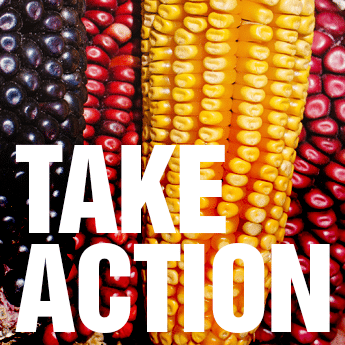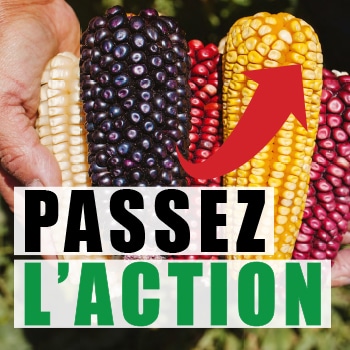Agrofuels
Agrofuels or biofuels?
The term “agrofuels” describes liquid fuels derived from food and oil crops produced in large-scale plantation-style industrial production systems. These agrofuels are blended with petrol and diesel for use primarily as transport fuel.
The term biofuels is used widely for any fuel derived from biological material in contrast to fossil fuels (coal, oil, gas) but where plants are cultivated in agricultural systems for the purpose of fuel production, the term agrofuel is more appropriate to include the specific context and problems such as monoculture plantations and the competition with land for food production. Common agrofuel crops are corn, soy and canola, which are also three of the dominant five GM crops.
“At the World Forum on Food Sovereignty, held in Mali in Africa, we and other delegates discussed how capital has manipulated terminology by adding the prefix “bio”, which signifies life, to renewable plant-based fuels. This is ridiculous, because all living things are “bio”. We could call ourselves bio-people, bio-John Smith, bio-soya, etc. Companies use the prefix “bio” to encourage the public to see their products as a good thing, as politically correct. So, at the international level, Vía Campesina has agreed to use more accurate terminology. These fuels and energy are produced from agricultural crops and so the correct terms are agrofuels and agro-energy.“
– João Pedro Stedile, a leader in the Movimento dos Trabalhadores Rurais Sem Terra (MST), Brazil’s Landless Movement, 2007
Introduction
“Beyond the extra cost to consumers, biofuels sideline food production and distract from real climate solutions.” – Kenneth Sigurdson, Biofuels: More Drain than gain, Watershed Sentinel, July 2022
Agrofuels are speeding us towards climate change. Agriculture already contributes at least 14% of global greenhouse gas emissions. Corn for ethanol, and soy and canola for biodiesel, are industrial monocrops that take fertilizers, pesticides and water to grow – and these three are also the major genetically engineered crops grown in the world.
The race to access crop land for fuel and food production is now resulting in a global “land grab” where foreign countries and companies are buying or leasing land. 86% of global biomass is located in the tropics and subtropics, driving an industrial grab that threatens to accelerate the pace of forest destruction and land acquisition in the South in order to feed the economies of the North.
In Canada, ethanol is made principally from corn and wheat. The Renewable Fuels Regulations (2010) require an average renewable fuel content of 5% in gasoline (5% based on the volume of gas that they produce or import into Canada and of at least 2% based on the volume of diesel fuel and heating distillate oil that they produce or import into Canada). Canada’s production of fuel ethanol has fulfilled about 61% of domestic demand, with U.S. ethanol fulfilling the remaining requirement. In 2020, Canada exported ethanol used as fuel for the first time (to Europe). Canadian ethanol plants produced 1.7 billion liters in 2020 and fuel ethanol consumption was 2.7 billion litres (see USDA 2022 report).
Watch Can the Biosphere Fuel Us? Critical Perspectives on Biofuels, by Dr. Rachel Smolker, hosted by the National Farmers Union (NFU) February 10, 2022.
- Read the debate on agrofuels between CBAN Coordinator Lucy Sharratt and Gord Quaiattini of the Canadian Renewable Fuels Association in the July/August 2011 Costco Connection
- Listen: Bioethanol and biodiesel not a green alternative, Interview with CBAN Coordinator Lucy Sharratt, Vancouver Cooperative Radio via Rabble.ca October 2010
- Read “Biofuels Backfire: hasty approach will impact environment, food production” by Lucy Sharratt, CBAN, from Common Ground magazine, July 2010
- Click here to download a background document from Food Secure Canada May 2010.
Updates
December 2024: Ethanol production and the livestock feed industry drive imports of corn and soybeans to Canada from the United States. Canada’s Clean Fuel Regulation is spurring investment into renewable diesel, and canola oil will be the main feedstock. See more reporting from the USDA.
November 2024: The National Farmers Union’s new report discusses “Sustainable Aviation Fuel” which could be made from solid biomass such as agricultural residues (grain straw, corn stover, husks, etc.), forestry residues (twigs, branches, bark, chips, sawdust); dedicated “energy crops” such as poplar, willow, switchgrass, and miscanthus; and algae to provide oils as a feedstock (though it is important to know that algae fuels have been discussed for decades but have yet to be scaled up or commercialized). “Many SAFs may prove to be no more than wishful thinking—distractions to buy time for a rapidly expanding, high-emission airline industry…SAFs are not feasible decarbonization solutions, but they are very likely a food-price problem, a soil health problem, a clean energy and green hydrogen demand problem, and a cause of accelerating extinctions and warming.” Read “Sustainable Aviation Fuel (SAF): A Critical Analysis, with a Focus on Agriculture, Land, and Food.“
June 2023: The renewable fuel standards in the US resulted in the expansion of cropland by as much as 7 million acres since 2008. “This often comes at the cost of habitat” for birds, butterflies etc. More than 80 million acres in the US is dedicated to growing corn and 25-40% of this corn crop is made into ethanol. (The US Department of Agriculture reports that, in 2020, approximately 92% of US corn grown is genetically modified). Click here for discussion.
July 2022: The Center for Biological Diversity has filed a lawsuit challenging the US Environmental Protection Agency’s fuel volume requirements for corn ethanol and other biofuels for 2020, 2021 and 2022. Earlier this month the EPA set the 2022 required minimum volume for transportation sector use at roughly 15 billion gallons of corn ethanol and 5.63 billion gallons of advanced biofuels. The lawsuit challenges the EPA’s failure to fully assess the impacts to endangered species from land conversion and additional pesticide and fertilizer use to meet these higher-volume targets. Read the latest article July 2023.
“The ever-increasing amounts of corn grown to burn as fuel only exacerbate dead zones in the ocean, worsen water pollution, and drive endangered species closer to extinction. The renewable fuel program is a colossal boondoggle that gobbles up millions of acres of land. It’s a false solution to the climate crisis, delaying the urgent need to transition to electric vehicles.” – Brett Hartl, Center for Biological Diversity, US
February 2022: A new five-year study of the impact of corn-based ethanol production in the US suggests it has led to increased fertilizer use, water pollution, and likely at least 24 more emissions than gasoline. Read about the study in the article How Corn Ethanol for Biofuel Fed Climate Change, Civil Eats, February 14, 2022.
2022: Canada’s draft Clean Fuel Standard, published in December 2020, outlines the beginnings of a nationwide framework for adopting a carbon intensity approach for renewable fuels. The final regulation is expected to be published in Spring 2022.
- See the Government of Canada’s information about the Clean Fuel Standard.
- Read the USDA summary of the Clean Fuel Standard.
April 2014: Biofuels such as ethanol made from the leftovers of harvested corn plants are worse than gasoline for global warming in the short term. A $500,000 study paid for by the U.S. federal government released in the peer-reviewed journal Nature Climate Change concludes that biofuels made with corn residue release 7 per cent more greenhouse gases in the early years compared with conventional gasoline. Read the CBC story here.
August 2012: There’s growing pressure on the Obama administration to end support for corn ethanol. The worst drought in the US in 50 years has not only condemned this year’s (mostly GM) corn crop but threatens next year’s too. The US government mandate requires unleaded fuel to be approximately 13% ethanol, regardless of supply.
August 2012: Growing demand for African palm oil for biofuels and as a key ingredient in cosmetics and processed foods is fuelling deadly land disputes in the Honduran countryside, pitting large landowners against landless peasants. At least 78 people have been killed over the past three years as a competition for land In Honduras heats up.
February 2012: A study from the George Morris Centre shows that Canadian ethanol production policies are responsible for increasing costs for the Canadian livestock sector by $130 million per year.
July 2011: Europe’s world-leading $13 billion biodiesel industry is on the verge of being legislated out of existence after studies reveal indirect impacts cancel out most of its benefits. Reuters: Climate impact threatens biodiesel future in EU
ETC Group Report, October 2010: “The New Biomassters – Synthetic Biology and the Next Assault on Biodiversity and Livelihoods” exposes the emerging global grab on plants, lands, ecosystems, and traditional cultures as industry shifts industrial production feedstocks from fossil fuels to the 230 billion tones of ‘biomass’ (living stuff) that the Earth produces every year – not just for liquid fuels but also for production of power, chemicals, plastics and more in the new “bioeconomy”.

Watch “Earth Grab”
Podcasts from the “Earth Grab” events:
English: http://www.youtube.com/view_play_list?p=5F4EBC94BF80D270
French: http://www.youtube.com/watch?v=VIkTO_mStFM&feature=channel
The rush to grow ‘biomass’ for fuels and industry will be worth $1/2 trillion – but won’t feed people, or stop climate change. Farm leaders from the Global South describe the reality and propose alternatives: Iderle Brénus, leader/organizer, Mouvement paysan Papaye, Haiti; Ibrahim Coulibaly, farm movement leader, COPAGEN, Mali. Presented by the Canadian Biotechnology Action Network, Development and Peace, ETC Group, Food Secure Canada, GRAIN, Greenpeace, Inter Pares, National Farmers Union, Peoples Food Policy Project, The Ram’s Horn, Union Paysanne, USC Canada. 2008.
Biofuels in Canadian Fuel
The government is implementing the “Renewable Fuels Regulations” to require that 5% of fuel come from agrofuels like corn ethanol. The Bill allows the federal government to develop and implement regulations requiring 5% average renewable content in gasoline by 2010 as well as require 2% average renewable content in diesel and heating oil by 2012.
The highly controversial new regulations were passed (Bill C-33) in June 2008 in the midst of the new food crisis and even as a contemporary study from Environment Canada found that the ecological footprint could not reliably be determined. At that time, there were many new reports discussing serious environmental and economic problems with agrofuels.
- The promised economic benefit to farmers will not be seen. The government’s own “regulatory impact statement” reveals that farmers will not benefit from the production of grains used to make the biofuels. The statement says more corn will be imported from the US to meet the biofuels regulation in eastern Canada!
- The impact statement also shows that consumers will bear most of the costs associated with the biofuel expansion – to a total of $2 billion. This is because the ethanol-blended gas has a lower energy content so consumers will need to buy more fuel! The statement also says: “Assuming all industry costs are passed on to the consumer, regional average cost over 25 years range from 7 cents in Ontario to a relatively higher impact of 30 cents in Quebec and the Atlantic provinces”.
- The promise that air quality would get better and thus improve the health of Canadians, yet a year after the Bill was passed a Health Canada report (2009) concluded that “there are no substantial differences in predicted health effects between use of conventional use (gasoline) and E10 (ethanol-blended gasoline).”
- The Federal Government still says the new biofuels mandate will be good for the environment, even though their own research indicates no statistical difference in Greenhouse Gas Emissions at the tailpipe between vehicles using ethanol and vehicles not using ethanol.
Because there was new research coming to light every day, when the Senate passed Bill C-33 in 2008 it also suggested that, “any new information that is available prior to regulations being proposed is taken into consideration before such regulations are promulgated.”
Press Release, Feb 27, 2008 P.E.I Biofuels Plant Under Fire at Agriculture Committee Hearing: Plant would create new market for Monsanto’s genetically engineered sugar beet
Global Conflict Over Agrofuels
The corporate “agrofuels” gold-rush has ignited a major global conflict. Find out why…
 Click here to watch Pat Mooney (2008) describe the disaster of rising food prices and how it is connected to the environmental destruction and social chaos brought on by the biofuels “gold-rush.”
Click here to watch Pat Mooney (2008) describe the disaster of rising food prices and how it is connected to the environmental destruction and social chaos brought on by the biofuels “gold-rush.”
“At the World Forum on Food Sovereignty, held in Mali in Africa, we and other delegates discussed how capital has manipulated terminology by adding the prefix “bio”, which signifies life, to renewable plant-based fuels. This is ridiculous, because all living things are “bio”. We could call ourselves bio-people, bio-John Smith, bio-soya, etc. Companies use the prefix “bio” to encourage the public to see their products as a good thing, as politically correct. So, at the international level, Vía Campesina has agreed to use more accurate terminology. These fuels and energy are produced from agricultural crops and so the correct terms are agrofuels and agro-energy.“ – João Pedro Stedile is one of the leaders of the Movimento dos Trabalhadores Rurais Sem Terra (MST), Brazil’s Landless Movement
August 2010, Friends of the Earth Europe and Africa report: Africa Up For Grabs: Africa is increasingly being seen as a source of agricultural land and natural resources for the rest of the world. National governments and private companies are obtaining land across the continent to grow crops for food and fuel to meet growing demand from mainly overseas countries.
Click here to read how agrofuels is pushing destructive GM soy monocropping in Latin America.
GE Trees
Biotechnology corporations are promoting genetically engineered trees and new GE crops for use as biofuels. Demand for wood is growing fast, partially in response to the expanding use of wood as a substitute for fossil fuels and petroleum based products. Burning wood for electricity, wood-based liquid transportation fuels, biochemicals, bioplastics, bioproducts, are all part of an envisioned “bioeconomy”. These new demands are on top of expanding demand for pulp and timber and expanding demand for agricultural products (a leading cause of deforestation) and the massive toll on forests from illegal logging.
The Biotechnology Industry Organization (BIO) Pacific Rim Summit on Industrial Biotechnology and Bioenergy September 10-12, 2008 in Vancouver was all about genetic engineering and new technologies for biofuels – including, and explicitly, GE trees. The conference included the session “Cellulosic Ethanol from Softwoods Around the World” and the presentation “Biotechnology in Purpose-Grown Trees to Make Bioenergy Production” by ArborGen, the leading company researching GE trees.
This corporate link with agrofuels was a major reason why Brazil, Canada and the US defeated the attempt by African governments to establish an international moratorium on GE trees at the United Nations Convention on Biological Diversity in 2008.
“Fast growing, purpose-grown trees are an ideal feedstock platform for second generation bioenergy production…Producing renewable energy from purpose-grown trees is the latest step in the evolution of trees’ long and fruitful history and critical to meeting global bioenergy development needs.”
– from summary to BIO Conference presentation “Biotechnology in Purpose-Grown Trees to Make Bioenergy Production” in the session “New Feedstocks for Biofuels”, a presentation from Barbara Wells of ArborGen, 2008.
Reports and Articles
Biofuels: More Drain than gain, Kenneth Sigurdson, Watershed Sentinel, July 2022
Backgrounder from Food Secure Canada, 2010
The Food Crisis a short opinion piece from the Food Security Policy Group and Food Secure Canada, 2008
The Dark Side of Brazil’s Agribusiness Boom: Violence, Mutiny and Environmental Pillage in the Amazon, Center for the Study of the Americas, October 2008
Feeding the World with GM Crops: Myth or Reality? GM Freeze, UK, June 2008 – The global food crisis is being used by some to call for more wide introduction of GM crops.
Via Campesina Position Paper – Small Farmers Feed the World: Industrial agrofuels fuel hunger and poverty, June 24, 2008
Food Sovereignty is the answer to the world food and energy crisis, Via Campesina, speech, May 29, 2008
Biofuels By Decree: Report from Burma, May – Burma’s military is implementing a nation-wide plan to plant eight million acres, an area the size of Belgium, with Jatropha curcas for biodiesel production. Two years into the campaign, the people of Burma have suffered forced labor, confiscation of farmlands, and threats to food security. At the same time, testimonies of crop failure and mismanagement expose how the campaign is a fiasco.
“Genetically Engineered Trees, Cellulosic Biofuels & Destruction of Forest Biological Diversity” Global Forest Coalition, Global Justice Ecology Project, February 2008
“The real costs of agrofuels: Food, forest and the climate” (72 page pdf) Global Forest Coalition, December 2007
Small scale sustainable farms are cooling down the Earth, Via Campesina, November 2007
GRAIN, Seedling special issue, July 2007
Agrofuels – towards a reality check in nine key areas, April 2007:
Full Report (pdf 34 pages)
Miguel Altieri and Elisabeth Bravo, “The ecological and social tragedy of crop-based biofuel production in the Americas” April 2007
Agrofuels in Africa: the impacts on land, food and forests, African Biodiversity Network, July 2007
More Resources
- Biofuelwatch, Europe
- GRAIN
- EcoNexus science and policy analysis from the UK
- The Oakland Institute policy analysis on land-grabbing and food price increases






